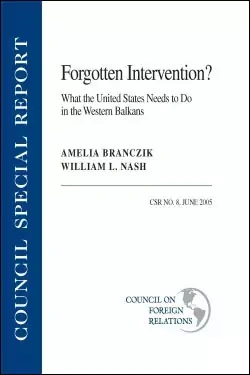
Forgotten Intervention?
What the United States Needs to Do in the Western Balkans

- Council Special Report
- Concise policy briefs that provide timely responses to developing crises or contributions to current policy dilemmas.
Overview
The price of U.S. and EU inaction in the western Balkans was amply illustrated in the 1990s, as opportunities for preventive action were squandered and the former Yugoslavia descended into brutal and devastating ethnic conflict, first in Croatia and Bosnia and Herzegovina and later on in Kosovo.
As is always the case, military intervention and the need for post-conflict reconstruction consumed significant U.S. resources—far more than the cost of thoughtful and decisive preventive action. A decade and a half later, the United States has another opportunity for preventive action, this time to avert a renewed crisis in Kosovo and achieve progress in Bosnia and Serbia and Montenegro that will help stabilize the region.
This report builds on the Center for Preventive Action's 2002 Task Force report, Balkans 2010. It identifies the principal steps that the United States can take to secure the investment it has made in the western Balkans and facilitate the region's progress toward its rightful destiny within the EU. In doing so, Forgotten Intervention? lays out a straightforward and doable strategy for the United States that will pay dividends.
More on:
This publication was made possible in part by a grant from Carnegie Corporation of New York. The statements made and views expressed are solely the responsibility of the author.
More on:
 Online Store
Online Store